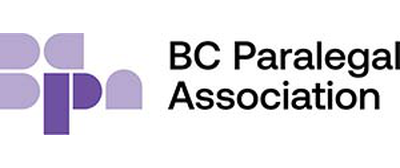Legal Professions Regulatory Reform (British Columbia)
Between March 2022 and May 2023, the BCPA worked with the Ministry of Attorney General and other stakeholders on the initiative to create a single legal regulator. The BCPA has been at the table throughout the discussions, steadily advocating for this modernization of the regulatory framework to bring legal professions under a new single regulator body including a new designation called a regulated paralegal offering people more affordable choices and increased access to legal services and support to solve their legal problems
The BCPA advocated strongly for the creation of a new category of regulated legal service provider called regulated paralegals. Paralegals who choose to become licensed would be free to handle certain legal matters independently, providing legal advice either as an independent legal service provider or within the context of a law firm/corporation. Others may prefer to maintain the status quo and continue their paralegal careers as they began. Regulation of paralegals will simply ensure that those who are committed to widening their service net in their communities will have the opportunity to do so. Those who are fulfilled with their current practice can continue unchanged.
On May 16, 2024, the Legal Professions Act (LPA) received Royal Assent. The LPA builds on government’s work to expand opportunities for people who need help with legal problems in B.C. Now, people in B.C. will have more affordable choices and increased access to legal services.
The Ministry of Attorney General has provided an overview of the single legal regulator initiative providing ongoing updates on its website. For a full overview, updates, and current status, please visit the Ministry of Attorney’s Legal Professions Regulatory Reform website page at: Legal Professions Regulatory Reform - govTogetherBC
LPA Frequently Asked Questions (FAQ)
Since the introduction of the Legal Profession Act (LPA), several questions have arisen. In response, the ministry has compiled a list of the top 17 frequently asked questions related to the implementation of the LPA.
This FAQ addresses a variety of topics, including the historical context of the LPA, its significance, its implications for the public, the benefits it offers to the legal community (including lawyers, notaries, and paralegals), and the structure of the new regulator.
You can read the FAQ here: LPA-Public-QAs_FINAL.pdf
Implementation Update
The Legal Profession Act (LPA) has established several transitional bodies to collaborate with the Law Society, the Notaries Society, and other partners in the transition to a new single regulator: Legal Professions British Columbia. These bodies include a transitional board, a transitional Indigenous council, and an advisory committee.
Transitional Board:
This board comprises four members appointed by the Law Society, one member from the Notaries Society, one member from the BC Paralegal Association, and one member appointed by the Lieutenant Governor in Council.
Transitional Indigenous Council:
This council includes three members appointed by the BC First Nations Justice Council, one member appointed by Métis Nation British Columbia, and up to two members from the transitional board, who will be selected by the board itself.
Advisory Committee:
The advisory committee is made up of the executive director (or their designate) from the Law Society, the Notaries Society, and the Law Foundation of British Columbia, along with one government employee appointed by the Attorney General.
These transitional bodies will remain active throughout the transition process, which is expected to take approximately 18 to 24 months.
For further details, please refer to the list of transitional appointees here: Transitional_Appointees_LPA.pdf
Additionally, the Attorney General has formed a working group to provide recommendations on the legal services that regulated paralegals should be able to offer to British Columbians. The Attorney General will consider these recommendations and consult with the regulator’s board before establishing the proposed scope(s) of practice, which will be determined by regulation under the LPA.
You can view the list of working group members here: RPWG-Appointees_LPA.pdf
Litigation activity
The Law Society of British Columbia (LSBC) and Trial Lawyers Association of British Columbia (TLABC) have filed notices of civil claim, alleging the legislation is unconstitutional. On June 7, 2024, the Attorney General of British Columbia filed a response opposing that position. You can read the pleadings filed in this proceeding here:
- Law Society Notice of Civil Claim (PDF, 1MB)
- Response to Law Society Civil Claim (PDF, 200KB)
- TLA Notice of Civil Claim (PDF, 6MB)
- Response to TLA Civil Claim (PDF, 500KB)
- Written Submissions of the Attorney General of British Columbia (PDF, 800KB)
As part of that proceeding, the LSBC and TLABC sought injunctive relief that that would delay the implementation of the LPA. The Court declined that request. See reasons for judgment here: 2024 BCSC 1292 (CanLII) | Law Society of British Columbia v British Columbia | CanLII.
The BCPA remains resolute: “Regulated paralegals will assist people throughout British Columbia who are barred from accessing traditional legal services. Paralegals in B.C., represented by the BCPA, have crucial and necessary legal expertise and handle matters across all practice areas, but remain widely unrecognized in the legal profession. The BCPA is looking forward to consulting with the new working group to establish a scope of practice for regulated paralegals, which is key to providing accessible, independent legal services in the public’s best interest.”
The BCPA will strive towards greater recognition of and responsibility for our profession, together with a higher level of information and training.
